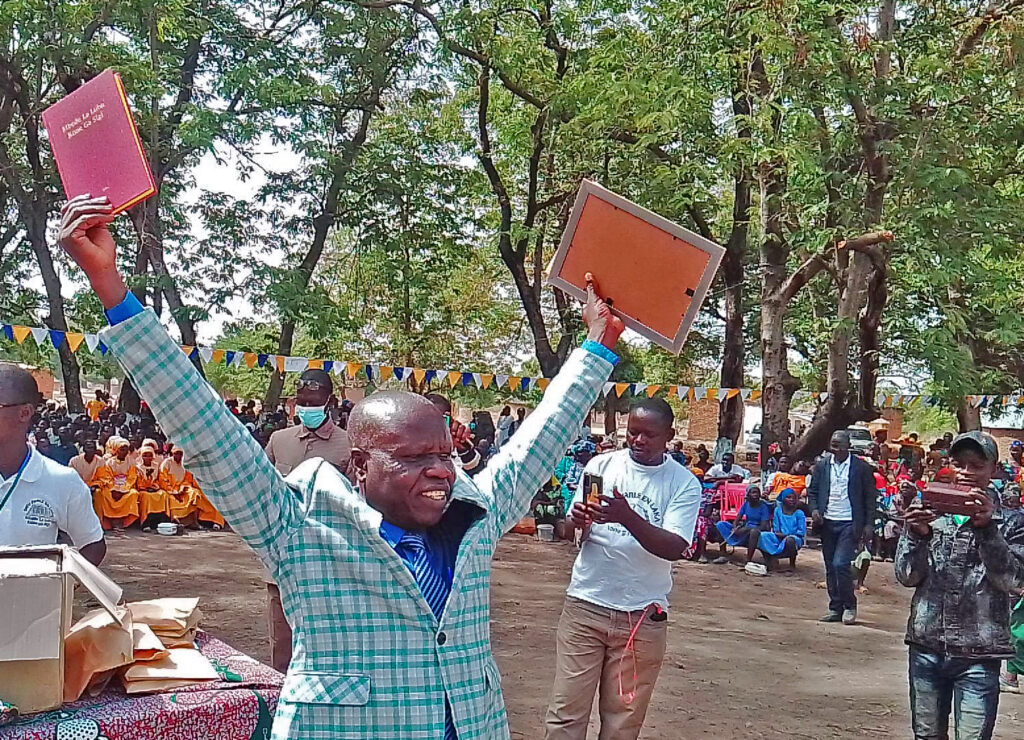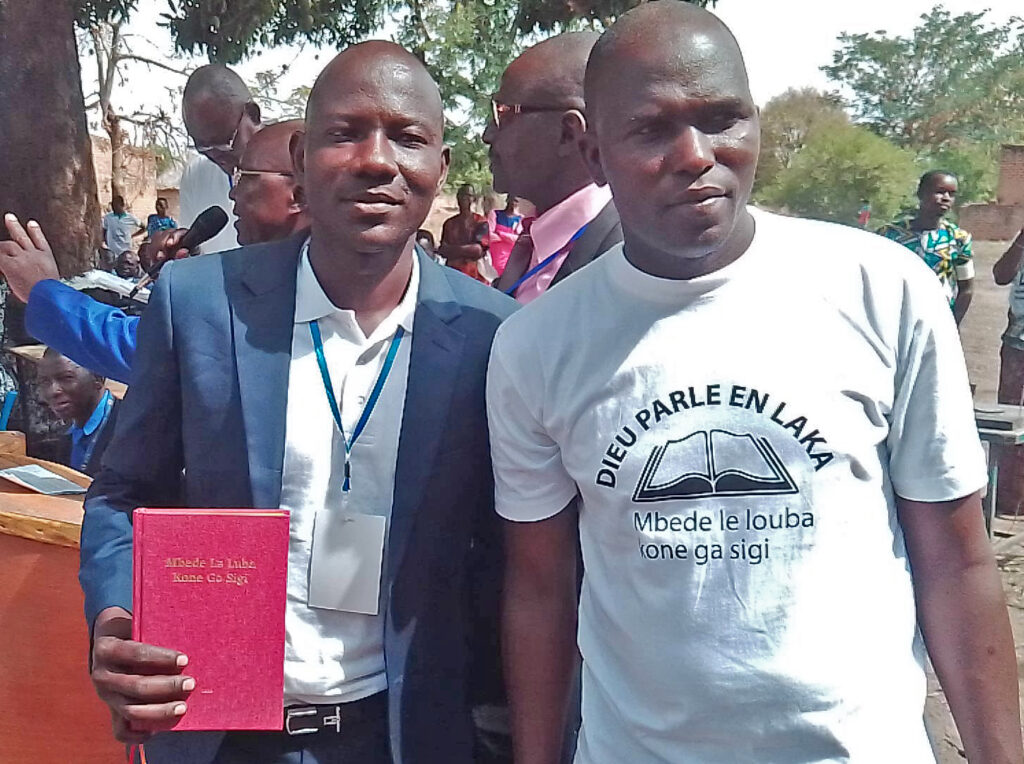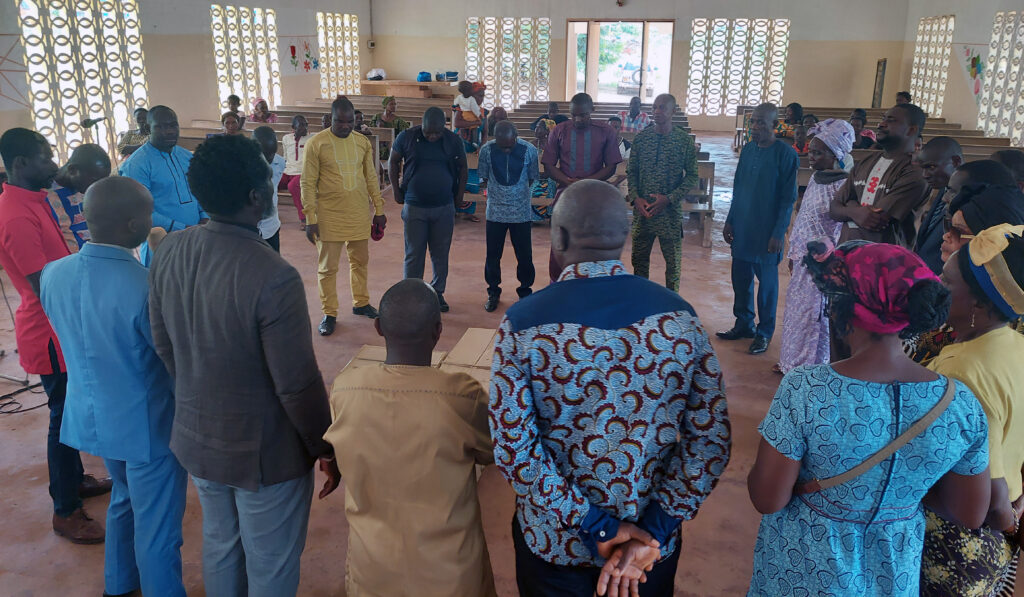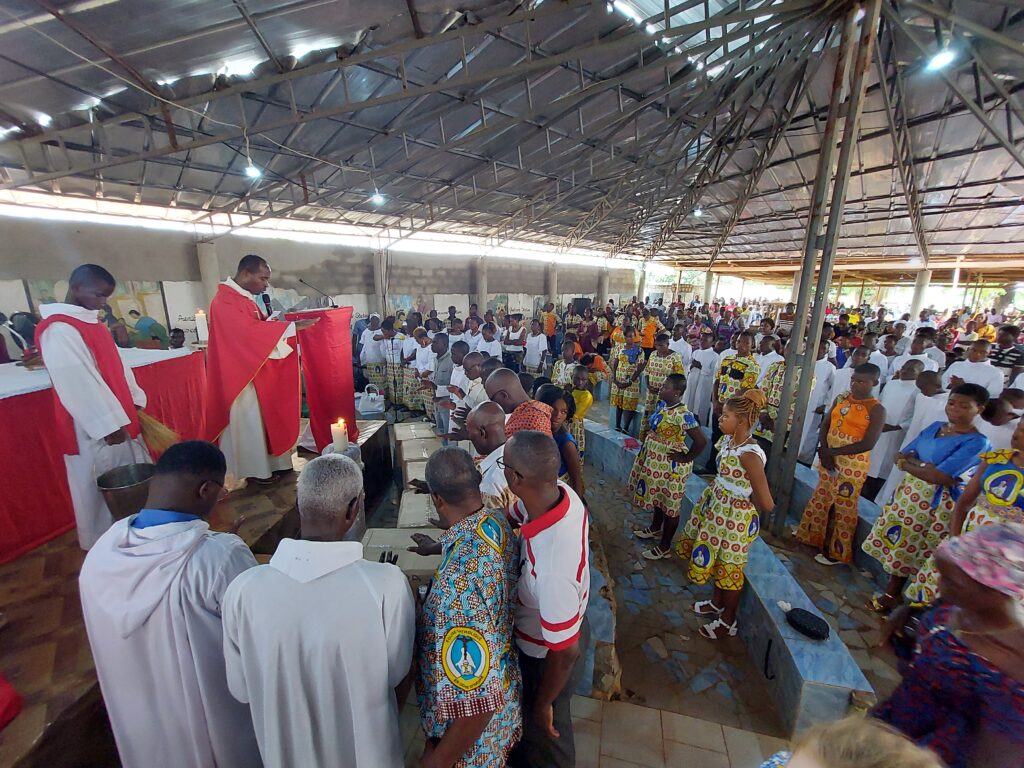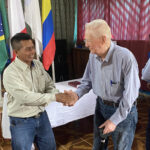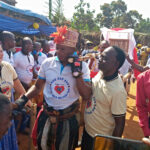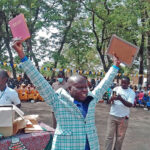“What you said really touched me!”
In March 2022, the Gbeya, Kaba, and Ngbugu people in the Central African Republic (CAR) celebrated the dedication of their New Testaments with songs, dancing, and speeches.
The road to possessing the Word of God in their own languages had been fraught with difficulties.
Over the years, three mission-worker families had worked on the Gbeya translation, and due to instability of the country, they had to be evacuated at various times. Later, the vast majority of the translation work was done by local speakers.
When the civil war broke out in 2002, the national Bible translation organization, ACATBA*, had taken ownership of the three projects. Earlier that year, when one of the foreign translation families had been in a car accident, one of the family members broke a neck and had to be medically evacuated. Also in 2002, a translator on the Gbeya team died. During the course of the work, four people on the Ngbugu team passed away.
The instability in the country forced the Gbeya translators to walk about 94 miles to get out of rebel-controlled territory. They took only what they could carry and disassembled their project laptop so that anyone who searched their bag would think it was an old, broken piece of equipment.
The only other New Testament belonging to a minority language group to be finished in the Central African Republic was in the 1940s, so praise God that he enabled these three people groups to have his Word all in one year! “What an amazing time to see multiple projects arrive at this milestone after so many years of faithful work by so many who have persevered through war and unrest,” said Judith Sawers, SIL CAR’s Communications director and prayer warrior.
The difficulties didn’t end with the publication of the New Testaments but continued into the dedication celebration. Because of civil unrest, special guests—Judith and her husband, Will; and Elizabeth Marti, the director of SIL CAR; and other translation consultants who had had significant input into each translation—had to travel from the capital, Bangui, to the dedication village via plane. Elvis Guenekean, ACATBA’s director, traveled with them.
On the day that Dennis Freeland, a JAARS-trained pilot serving with SIL Cameroon, was supposed to depart Yaoundé, Cameroon, to pick up his passengers, a large storm had developed in-between Yaoundé and Bangui. Avoiding the storm would have required flying more than 100 miles out of the way, and their plane didn’t carry enough fuel to ensure they’d still have their required reserve. “I sat and waited, knowing that not getting there could possibly mean that our team would not be able to attend the dedication,” Dennis said.
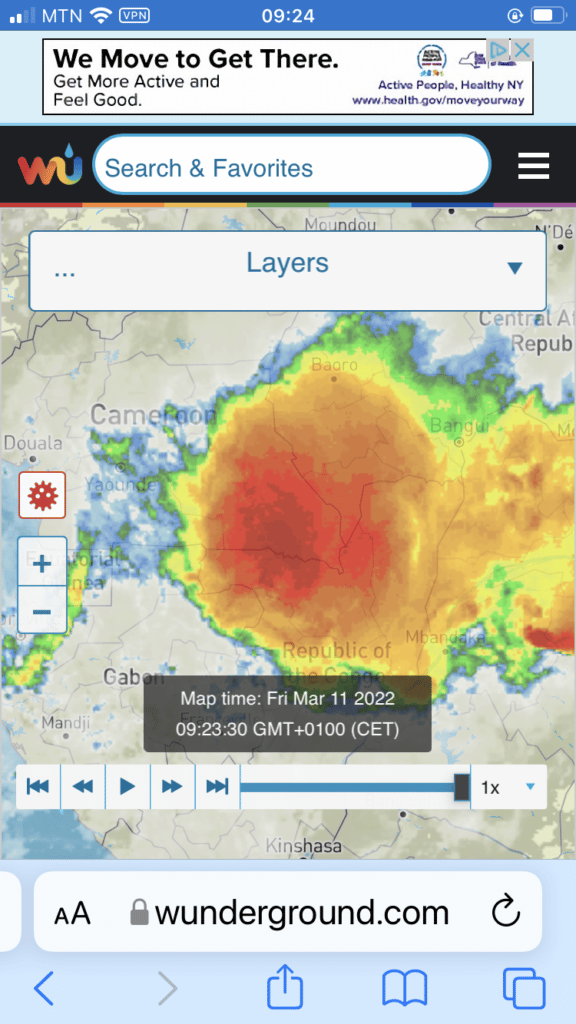
Dennis waited into the afternoon, but the storm did not move or dissipate. He had to make the difficult phone call saying that he wouldn’t be able to make it that day, but he offered to try to leave at sunrise the next day. This would make the group two and a half hours late, but they’d still be able to attend the celebration.
The next morning, the satellite showed a few small storms along the route, but nothing like the day before. Dennis took off, and even though several times it looked like he might encounter rain, he made it without having to deviate from his course.
After filling out the required paperwork and refueling, Dennis and his passengers left for the dedication two hours after it had begun. As they flew north, visibility worsened. At first, Dennis thought he had flown into the clouds. A few minutes later, he realized that they weren’t clouds, but harmattan—dust that blows down from the Sahara desert.
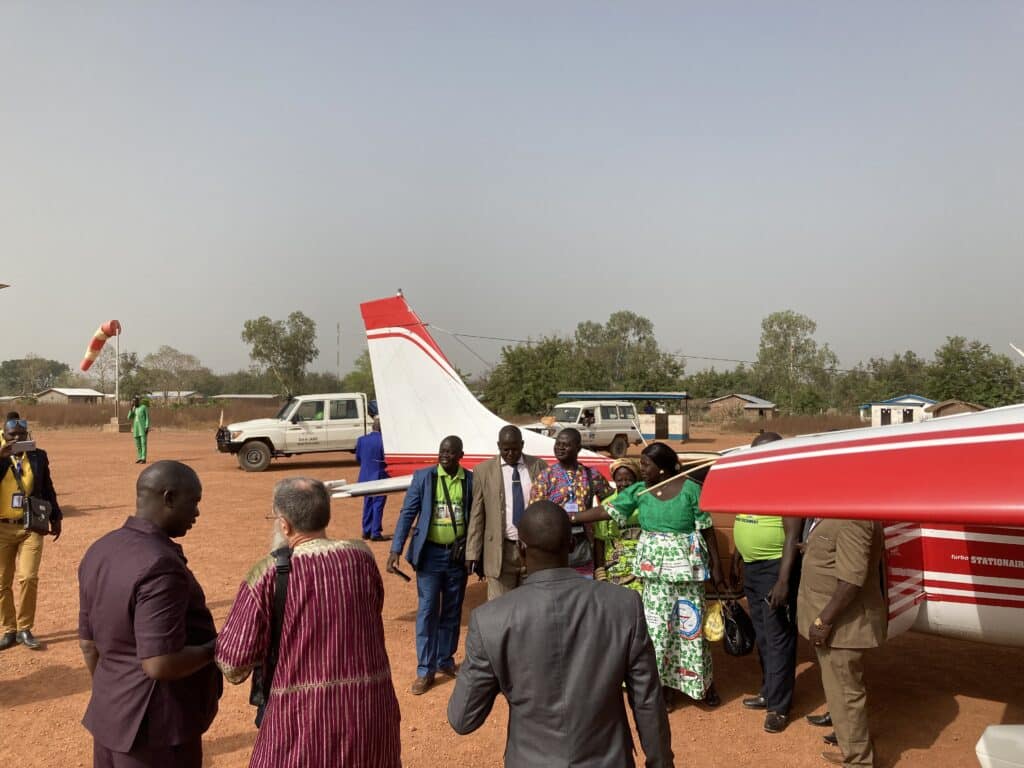
Thankfully, Dennis’ GPS took him straight to the runway, and he landed safely after the second approach. Waiting for them were two trucks, one of which said “Gift from JAARS” in French. This Land Cruiser was funded by people like you who gave to JAARS Land Transportation Solutions. Thank you! It had carried some of the national translators as well as the New Testaments over rough roads.
The vehicles whisked away the passengers to the ceremony. The return flight was much calmer, which made Dennis think of the spiritual battle to get the New Testament translated, symbolized by the chaos and challenges of reaching the dedication. As he said, “After the dedication, there is the peace that comes from having God’s Word.”
Four days later, Dennis flew some of the same group without much hassle to the Kaba New Testament dedication. There, they again were met by the JAARS-funded vehicle, which had also helped transport New Testaments and translators. Several weeks earlier, it had also been used to help with the Ngbugu New Testament dedication. “If not for the airplane, our team would not have been able to attend and celebrate this milestone with the Kaba people,” Dennis said. “It is very humbling to see all that these people have gone through and lost, and yet to have joy and to cherish God’s Word in their language.”
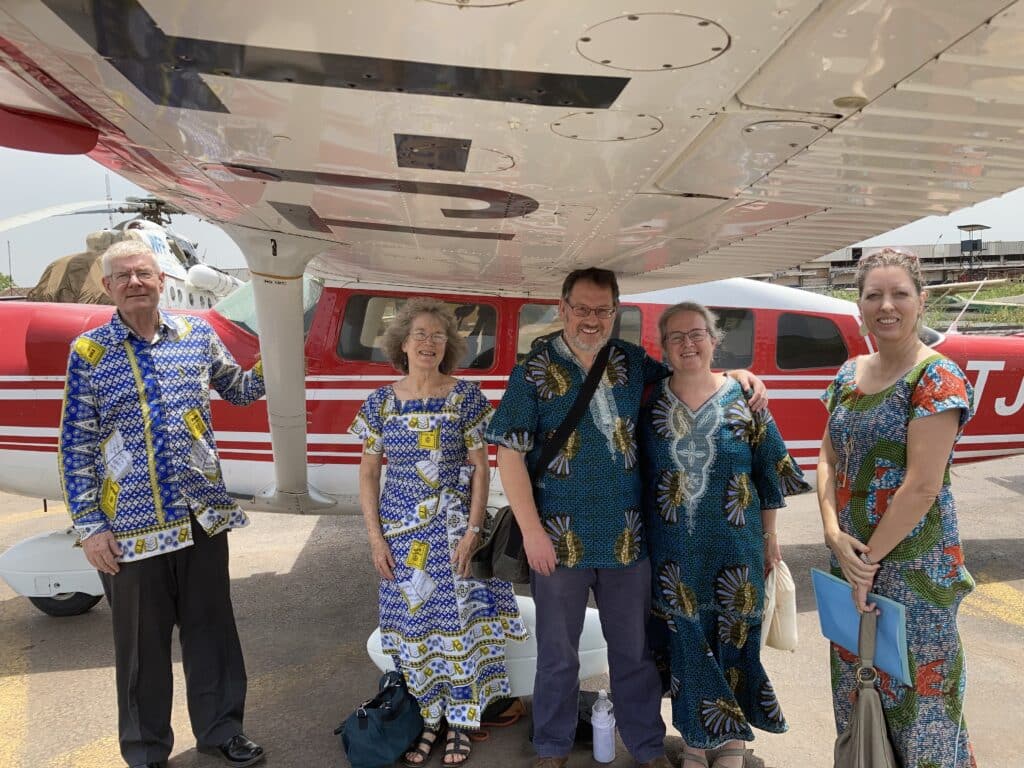
Years ago, when only Luke’s Gospel was available, Georgine Kofedanga, a women’s pastor at a church in Bossangoa, CAR, spoke to a women’s group and decided to read from Luke’s Gospel in Sango—a trade language. “But just as I was about to begin my talk, the Lord showed me that I should read from my Gbeya copy of Luke. And then, as I was about to start explaining the passage, the Spirit moved me to do it in Gbeya! So when I’d finished [teaching], one of the older women came up to me and said, ‘My daughter, what must I do to see the Kingdom of God? What you have said in Gbeya really touched me.’”
In all the years that Georgine had taught in Sango, she had never faced a question like this! Even though the woman attended church regularly, she had never benefited from all the preaching she’d heard in Sango each Sunday.
“Ever since that day, I’ve understood that the translation of the Bible into Gbeya is quite indispensable if people are to truly understand the Word of God,” Georgine explained. “Since then, I’ve committed to reading the Bible portions that are already in Gbeya with this older lady, and her life has really changed compared with before.”
Imagine what can happen now that the whole New Testament is in people’s hands!
Join us in praying that God uses this Scripture to bring many people to him.
* Association Centrafricaine pour la Traduction de la Bible et l’Alphabétisation



























































